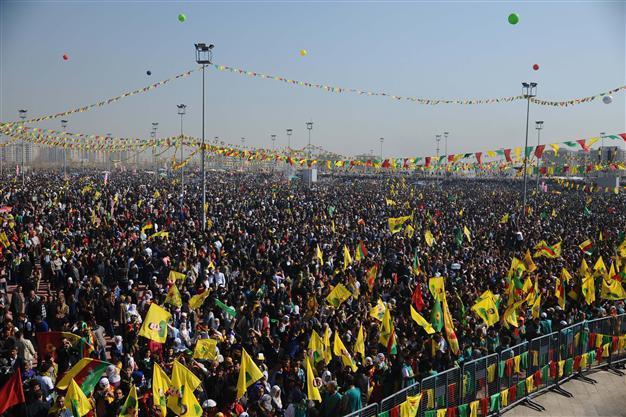Öcalan calls on Kurdish militants to bid farewell to arms for a ‘new’ Turkey
DIYARBAKIR - Hürriyet Daily News

Hundreds of thousands of people gather in the southeastern province of Diyarbakır to celebrate the spring festival Nevruz and to hear a message conveyed by Abdullah Öcalan, the PKK’s jailed leader. The message was read in Turkish and Kurdish by BDP lawmakers Pervin Buldan and Sırrı Süreyya Önder. DAILY NEWS photo / Selahattin SÖNMEZ
In his long-awaited Nevruz message, the jailed leader of the Kurdistan Workers’ Party (PKK) Abdullah Öcalan declared a ceasefire and called on armed militants to withdraw from Turkish soil, indicating that these moves would mark a milestone for “a new era” and herald the building of a “new Turkey.”
“We have come to a point today where guns shall be silenced and thoughts and ideas shall speak. A modernist paradigm that ignores, denies and externalizes has collapsed. Blood is being shed from the heart of this land, regardless of whether it is from a Turk, Kurd, Laz or Circassian. A new era begins now; politics comes to the fore, not arms. Now it is time for our armed elements to move outside [Turkey’s] borders,” Öcalan said in his historic message, read out at Nevruz celebrations in the southeastern city of Diyarbakır on March 21.
“Our fight has not been against any race, religion or groups. Our fight has been against all kinds of pressure and oppression. Today we are waking up to a new Middle East, a new Turkey, and a new future,” he said in his message, frequently using the term “fraternity” - a notion that was also highlighted in Nevruz messages delivered by Turkish leaders a day before.
“It is time for unity. Turks and Kurds fought together in Çanakkale [during World War I], and launched the Turkish Parliament together in 1920,” said the message.
“I call on everyone to build democratic modernism to escape the pressures that are clearly against history and fraternity,” it added.
The PKK leader’s message was read out by Peace and Democracy Party (BDP) co-chair Pervin Buldan and BDP deputy Sırrı Süreyya Önder, both in Kurdish and Turkish. The message is part of an ongoing resolution process initiated by the government to end a three-decade-old conflict with the outlawed group.
“The Middle East and Central Asia are looking for a new order. A new model is a necessity, like bread and water. It’s inevitable that Anatolia and Mesopotamia will be pioneers in building this model. We are living through an actual, complex and deepened derivation of the National Independence War [between 1919 and 1922] that was fought by Turks and Kurds within the framework of the National Pact,” Öcalan said, referring to the “National Pact” of 1920, which essentially set out Turkey’s present boundaries during the Independence War.
“This is not an ending, but a new beginning. This is not giving up the struggle, this is the launching of a different struggle,” Öcalan said. “The ground of the new struggle is ideas, ideology and democratic politic - launching a grand democratic action.”
“Today a new era is beginning. A door has been opened from armed struggle to democratic struggle,” added the message, which was addressed to more than a million people who had gathered in Diyarbakır to celebrate Nevruz.
Unity call“The notion of ‘we’ that has an important place in the historicity of these lands has been degraded to ‘one’ by monist ruling elites. It’s time to give back the old spirit of the notion of ‘we.’ We will integrate with each other in the face of those who intend to divide us and provoke us to conflict. We will unite against those who divide us,” Öcalan said.
Öcalan’s message was warmly welcomed by the million-strong crowd gathered at the city’s Nevruz Park who were carrying posters of Öcalan; flags of the PKK; flags of the Kurdistan Communities Union (KCK), the urban wing of the PKK; and the flag of the first ever independent Kurdish state – the Republic of Mahabad – which is also used by the Kurdistan Regional Government (KRG) in northern Iraq.
Photos of PKK leaders Ethem Karabulut and Şirin Cebe, both killed in recent operations, were hung onto the walls of main platform for the event, as well as photos of inmates at the infamous Diyarbakır Military Prison No. 5 who set themselves on fire in protest at systematic prison torture during the early 1980s.
Organizers also hung photos of Sakine Cansız, Fidan Doğan and Leyla Söylemez, three female Kurdish activists who were murdered in Paris on Jan. 9.
